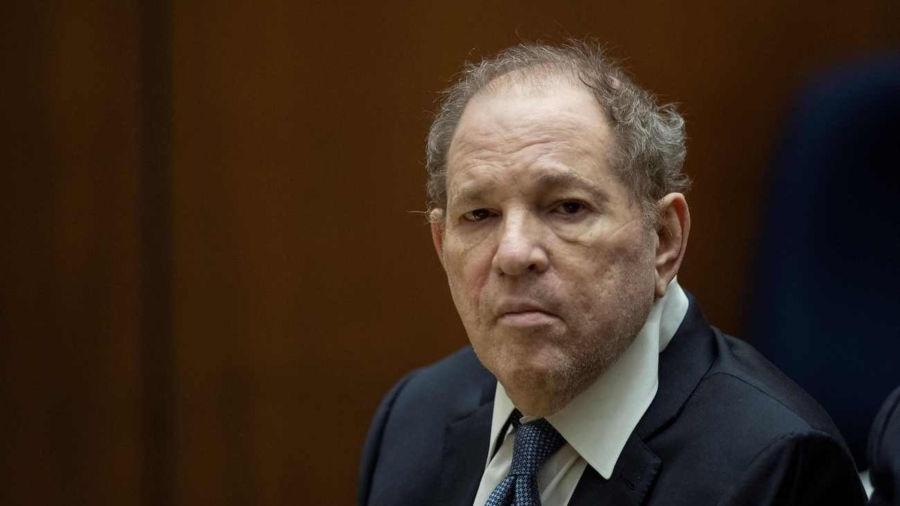Harvey Weinstein’s 2020 rape conviction was overturned by New York’s highest court, citing the trial judge’s prejudicial handling of the landmark #MeToo case. The 4–3 decision on Thursday highlighted the judge’s “egregious” missteps, including allowing testimony on allegations unrelated to the case, prompting the court to order a new trial.
This decision reignites a painful episode in America’s confrontation with sexual misconduct by influential individuals, a saga sparked by a deluge of accusations against Mr. Weinstein starting in 2017. The majority opinion in the Court of Appeals condemned the admission of unproven allegations, emphasizing that such actions merely tarnish a defendant’s character without bearing relevance to their credibility concerning the charges at hand.
“We conclude that the trial court erroneously admitted testimony of uncharged, alleged prior sexual acts against persons other than the complainants of the underlying crimes because that testimony served no material non-propensity purpose,” the court’s decision said.
However, dissenting Judge Madeline Singas sharply criticized the majority’s stance, accusing them of reshaping facts to fit a simplistic narrative. Judge Singas lamented the court’s perpetuation of outdated views on sexual violence, expressing concern over a pattern of overturning jury verdicts in cases involving such offenses.
The disgraced movie mogul, 72, currently serving a 23-year term in a New York correctional facility for previous convictions, faces continued imprisonment following a 2022 rape conviction in Los Angeles, where he received a 16-year sentence. Despite this setback, he remains adamant about his innocence, asserting that any sexual encounters were consensual.
The reversal of Mr.Weinstein’s conviction marks another blow to the #MeToo movement. Mr. Weinstein’s conviction, hailed as a milestone by activists, has now been thrust back into scrutiny, challenging the foundation of justice it purportedly laid.
Mr. Weinstein’s legal team argued vehemently against Judge James Burke’s handling of the trial, contending that his decisions unfairly tilted the proceedings against their client. They criticized the admission of testimony unrelated to the charges, arguing that it unfairly prejudiced the jury against Weinstein.
While prosecutors defended Judge Burke’s rulings as necessary to provide context, Mr. Weinstein’s lawyers maintained that the additional evidence only served to demonize their client. They highlighted Mr. Weinstein’s desire to testify in his defense but refrained due to the restrictive parameters set by the court.
The Court of Appeal’s decision to overturn Mr. Weinstein’s conviction comes after prolonged scrutiny of Judge Burke’s conduct during the trial. The absence of Judge Burke, whose term ended in 2022, underscores the complexities surrounding the case’s legal journey.
Mr. Weinstein’s legal team sought a retrial, primarily focusing on the criminal sexual act charge, as the statute of limitations bars retrial on the rape charge.
Los Angeles Conviction
In 2020, Los Angeles Superior Court Judge Lisa Lench ruled that former movie mogul Harvey Weinstein faced an additional 16 years behind bars. This followed his conviction in December 2020 on three counts of rape and sexual assault in Los Angeles. Weinstein, aged 70, is already serving a 23-year sentence in New York for similar charges, implying a probable life sentence for him.
Judge Lisa Lench specified that this new sentence would be consecutive, commencing only after Mr. Weinstein completes his existing term in New York.
During the Los Angeles trial, the key witness, identified as “Jane Doe #1,” recounted being assaulted by Mr.Weinstein, a European model, during a film festival in February 2013.
Once an influential figure in Hollywood, Mr. Weinstein faced trial in California on seven counts of sexual assault and rape involving four women spanning from 2004 to 2013. The jury acquitted him of one charge and remained deadlocked on three others.
Initially facing eleven charges in Los Angeles, four were dropped before trial, including those tied to “Jane Doe #5,” due to the state’s inability to pursue the allegations.
Allegations from numerous women, exposed by publications like The New York Times and The New Yorker in October 2017, played a pivotal role in sparking the #MeToo movement.
From The Epoch Times

